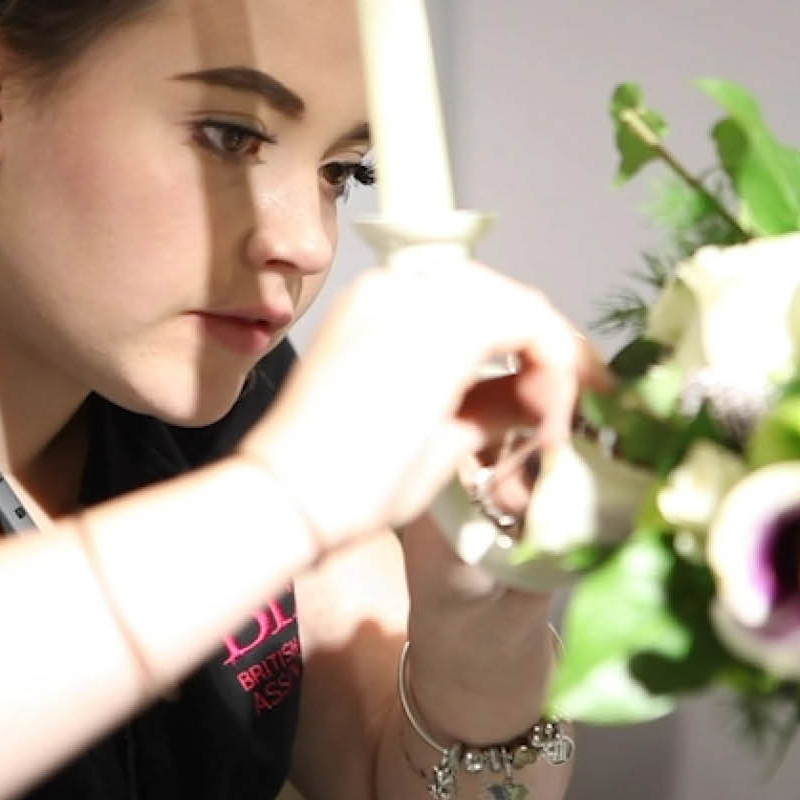
British Floral Association’s role in WorldSkills UK competitions:
For the past 13 years, I have been working on behalf of the British Floral Association (BFA) as the Competition Organising Partner for the WorldSkills UK Floristry National Competition. Together with lead Judge Lynda Owen and the floristry international training manager Laura Leong, I support the development of the tasks for the competition.
Year on year, we review the content of the competition, updating the skillset and standards based on national and international standards and industry trends. I work closely with colleges and floristry tutors to ensure that they are included in developments and up-to-date with the latest developments. The floristry trailblazer apprenticeship was developed in part through the work of updating these standards, which means we are getting more uptake of business and apprentices taking part in our competitions.
Benefits for learners taking part
Along with developing time-management skills and being encouraged to think outside the box, florists taking part in the competitions are exposed to new styles of floristry as part of their continuing professional development (CPD). Despite changing fashions and consumer demands many florists and businesses can get stuck in old ways of doing things. The best florists are those that can influence customers in addition to responding to consumer demand. This is something a business may struggle to think about on their own and is one of the places where competitions can benefit a florist’s development, by allowing them to learn how to drive innovation in their field.
Sustainability in the floristry sector
Sustainability is a growing trend in all sectors and our competition has been developed to reflect this. This is the second year that we have incorporated sustainable methods into our competition. We have consciously incorporated techniques and sundries that do not harm the environment, ensuring that they are re-usable and biodegradable. Reducing waste is also part of our competition practice and something competitors are judged on throughout our competitions, as well as their ability to work with sustainable materials.
Sustainability and colleges
Sustainability is also high on the agenda with colleges and training providers. In part, this is often driven by an educator’s own initiative as there are some curriculums that may not cover this or green skill development. Most educators strive to give their students up-to-date information and work around the curriculum to provide new sustainable alternatives to teaching skills. Students are very open to learning and practising sustainable methods as well.
Having competition activity within the curriculum doesn’t necessarily mean additional work, it’s about enhancing what’s already in place through different ways of learning. The concept can be introduced gradually into the classroom so students get comfortable with the idea competing, as a way of building their skills and confidence.
Driving green skill development
I’d like to think that green skill development is something that is translatable across each sector. One of the most crucial things that both businesses and educators can do to encourage green skill development is to get learners to think about how to transfer their knowledge of sustainability to their customers and make alternative practices appealing to them.
There is an important role that educators and trainers play in providing learners with an understanding of how they can persuade consumers on the importance of doing things sustainably. One business I used to work at for example, started an initiative with their customers to bring back plastic boxes and bags.

There is an important role that educators and trainers play in providing learners with an understanding of how they can persuade consumers on the importance of doing things sustainably. One business I used to work at for example, started an initiative with their customers to bring back plastic boxes and bags.
The reuse of and recycling of plastics is a simple skill and something that should be encouraged by all tutors and business. As well, teaching on the importance of minimising waste is crucial in green skill development. For our floristry competition, five marks are deducted if judges find wastage in bins, eg throwing away of flower heads that didn’t need to be thrown away.
Other areas of green skill development are encouraging seasonable buy-in. Buying local items, in season, is very important. What is also crucial is teaching trainees how to research and reflect on the supply chain of their materials, to make sure it’s ethically grown. This is something that can translate across many sectors and works well to encourage sustainability and green skill development in floristry.
WorldSkills UK Competitions driving standards
The floristry sector has steadily become more professionalised, and the work of the WorldSkills UK Floristry National and international competitions are a driving factor. The national programmes and the development workshops that take place as part of them are highly beneficial for learners. Part of the work of the competitions involves debriefing tutors on good practice and identifying skill or knowledge gaps in their learners, so that skill gaps can be addressed within education and business. The challenge to raise and develop standards each year has led to great innovation within and to the qualifications written across the country to be more in line to the European and international levels of skillsets in the sector.

It’s important for competitors to have at least a level two accredited qualification or to be studying as an apprentice for the competition. The competition is open entry, so students who have just started a level two in floristry can enter the competition and take part in the passive stage to get an insight into the competition and to encourage future involvement. For the competition itself, competitors are expected to be at the standard of working towards a level three qualification. The minimum age to get involved in our competitions is 16 and there is no age cap at the national competition level.
Sandie Griffith, the British Florist Association


